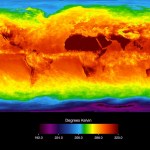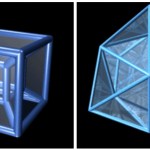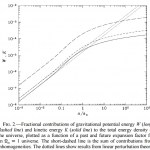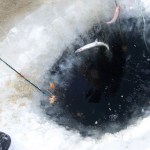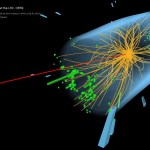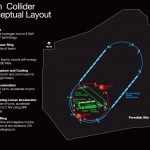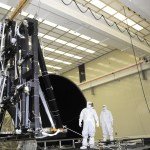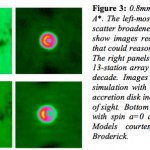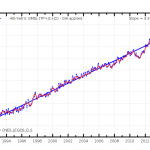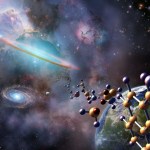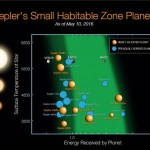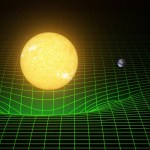
"We've arranged a global civilization in which most crucial elements profoundly depend on science and technology. We have also arranged things so that almost no one understands science and technology. This is a prescription for disaster. We might get away with it for a while, but sooner or later this combustible mixture of ignorance and power is going to blow up in our faces." -Carl Sagan
On Saturday, April 22nd, scientists, science teachers, science enthusiasts and science fans will all come together for a variety of reasons, all over the world, to March for Science. While there are…
"Entropy shakes its angry fist at you for being clever enough to organize the world." -Brandon Sanderson
The universe was born hot, dense, expanding, full of matter, antimatter and radiation... and in a low-entropy state. If entropy is a measure of disorder, though, that sure does sound like an awfully high-entropy state, not a low-entropy one. So why, when we talk about the Universe, do we say that the early Universe had such low entropy?
Our Universe, from the hot Big Bang until the present day, underwent a huge amount of growth and evolution, and continues to do so. Image credit: NASA /…
“There is a fifth dimension, beyond that which is known to man. It is a dimension as vast as space and as timeless as infinity. It is the middle ground between light and shadow, between science and superstition.” -Rod Serling
If we take a look at a two-dimensional surface, it’s pretty apparent that we’re pretty omnipotent in comparison. We can draw or erase anything in that dimension, add or remove objects, rearrange their internal structures without leaving them any defense, etc. All of that might lead you to wonder whether there’s the possibility of a fourth spatial dimension out there, and…
"I do have a blurred memory of sitting on the stairs and trying over and over again to tie one of my shoelaces, but that is all that comes back to me of school itself." -Roald Dahl
Most of us learn to tie our shoes when we’re very young, go through life tying it through that very same method, and never think about it again. Yet for some of us, routinely untied shoelaces are a part of our daily lives, while for others, our shoes rarely come undone, even without double-knotting them. The reason for this is twofold: one is the way we wear our shoes, but the other is the way we tie them.
The…
"I would like nuclear fusion to become a practical power source. It would provide an inexhaustible supply of energy, without pollution or global warming." -Stephen Hawking
Climate science is a hotly debated area, with many disputing the robustness and ethical motivations of the scientists in the field. But even if you throw everything we know about carbon dioxide, global warming, and climate change away, there’s still an energy crisis coming in the long term. The fact is, fossil fuels will someday, hundreds of years from now, run out if we extract and burn them all.
Wind farms, like many…
"Losing an illusion makes you wiser than finding a truth." -Ludwig Borne
Every so often, an idea comes up in physics claiming that perhaps dark energy isn't real. The ideas focus on one of two lines of thought: either they discount the observational evidence, or they attempt to show that all the calculations are fundamentally flawed.
Measuring back in time and distance (to the left of "today") can inform how the Universe will evolve and accelerate/decelerate far into the future. We can learn that acceleration turned on about 7.8 billion years ago. Image credit: Saul Perlmutter / UC Berkeley…
"We’ve taken a major step back in time, beyond what we’d ever expected to be able to do with Hubble. We see GN-z11 at a time when the universe was only three percent of its current age." -Pascal Oesch
Arriving at our eyes after a journey of 13.4 billion years, the light from galaxy GN-z11 has been traveling towards us for 97% of the Universe’s present age. It’s detection and discovery, however, was a lot more complicated than simply opening up your telescope’s eyes and collecting enough light; a confluence of four separate things needed to happen all at once to make it possible.
Schematic…
“There is a fine line between censorship and good taste and moral responsibility.” -Stephen Spielberg
Another week full of amazing science stories has gone by here at Starts With A Bang, and there are some fun and fantastic announcements! We welcomed a new contributor, Jess Shanahan, to our ranks; I found out that Forbes has made me their official Star Trek: Discovery reviewer when that new series premieres; I'm in the process of selecting the final, officially licensed images for my new book, Treknology (and pre-order today!); and from this coming Thursday through Sunday, I'll be the Science…
"There is a limit on how much information you can keep bottled up." -Dick Gregory
There are fundamental limits to the Universe, in the sense that there are scales where our laws of physics break down. You can't break matter or energy up into infinitely small pieces, and the same goes -- we think -- for space and time. But is that necessarily all true, and is that what the Planck scale means? Not quite.
Although X-ray observations have set limits on the granularity of space, they have not probed anywhere near down to the Planck scale. Image credit: X-ray: NASA/CXC/FIT/E. Perlman; Illustration…
"It does not matter how slowly you go as long as you do not stop." -Confucius
The large hadron collider is the world’s most powerful particle accelerator, colliding two protons at energies of 6.5 TeV apiece. But you’ll never have the full 13 TeV of energy available for that collision, thanks to the fact that the proton itself is a composite particle, and that energy is distributed throughout its components. When you get a collision, only a fraction of that energy goes into the collision itself, while the rest remains in the other component particles.
A candidate Higgs event in the ATLAS…
"Resources exist to be consumed. And consumed they will be, if not by this generation then by some future. By what right does this forgotten future seek to deny us our birthright?" -Sid Meier's Alpha Centauri
The dream of humanity has long been to identify an inhabited world beyond Earth, to know for certain that life is not unique to our pale blue dot. If we were located a great distance away, there are observations of Earth we could make that would tell us a tremendous amount of information about our world, including about its oceans, clouds, continents, the "greening" of our…
"Hey, if our eyes could access the infrared part of the light spectrum, the sky would be green and trees would be red. Some animals see in completely different ways, so who knows what colors look like to them. Nothing is really how we perceive it." -Wendy Mass
If you take a look at the James Webb Space Telescope, the most visually striking feature of all is the gold mirrors. Yet gold would make an absolutely terrible material for constructing these mirrors! For very sound scientific reasons, the vast majority of these mirrors are made out of beryllium, not gold, and gold doesn't even enter…
"Aha! That satellite was scuttled on Enceladus, Saturn's main dump moon!" -Professor Farnsworth, Futurama
When you think about life beyond Earth, you likely think of it occurring on a somewhat Earth-like planet. A rocky world, with either a past or present liquid ocean atop the surface, seems ideal. But that might not even be where life on Earth originated! Deep beneath the Earth’s surface, geologically active hydrothermal vents currently support diverse colonies of life without any energy from the Sun. Saturn’s icy moon, Enceladus, has a subsurface ocean unlike any other world we’ve yet…
“Never look down to test the ground before taking your next step; only he who keeps his eye fixed on the far horizon will find the right road.” -Dag Hammarskjold
One of relativity’s oddest predictions is the existence of black holes, objects so dense and massive that nothing, not event light can escape from them. But that lack-of-escaping is limited to a certain volume of space: that within the black hole’s event horizon. Although black holes have been detected and identified, an event horizon has never yet been imaged. That, however, is likely about to change when the Event Horizon Telescope…
"You are not here merely to make a living. You are here in order to enable the world to live more amply, with greater vision, with a finer spirit of hope and achievement. You are here to enrich the world, and you impoverish yourself if you forget the errand." -Woodrow Wilson
It's been another fantastic week here at Starts With A Bang, and I've got to laud all of you for doing your best to make it a good one! Let's get right into what this past week held:
Is there any such thing as pure energy? (for Ask Ethan),
More than stars: the Milky Way's dust mapped in 3D for the first time ever…
"The layman always means, when he says "reality" that he is speaking of something self-evidently known; whereas to me it seems the most important and exceedingly difficult task of our time is to work on the construction of a new idea of reality." -Wolfgang Pauli
On the surface, it shouldn’t appear to make all that much difference to the Universe whether a particle has a spin in half-integer intervals (±1/2, ±3/2, ±5/2) or in integer intervals (0, ±1, ±2). The former is what defines fermions, while the latter defines bosons. This hardly seems like an important distinction, since intrinsic…
"You can spend too much time wondering which of identical twins is the more alike." -Robert Brault
When we think of the idea of “Earth’s twin,” we inevitably think of a planet like ours orbiting a star like ours at the same distance and speed. Most planets are not rocky and Earth-sized; most stars are not like the Sun; most planetary orbits don’t have Earth’s orbital parameters. Yet the idea that a twin of our planet is out there, and that’s the most likely place to look for life, persists.
Although many of the Earth-like candidates from Kepler are close to Earth in physical size, they…
"I much prefer the sharpest criticism of a single intelligent man to the thoughtless approval of the masses." -Johannes Kepler
There are a lot of myths we have in our society about how the greatest of all scientific advances happened. We think about a lone genius, working outside the constraints of mainstream academia or mainstream thinking, working on something no one else works on. That hasn’t ever really been true, and yet there are actual lessons – valuable ones – to be learned from observing the greatest of all scientists throughout history.
The gravitational behavior of the Earth…
"If something doesn’t reach you on a personal level, let it go. It’s hard enough dealing with everything that does." -Judi Culbertson
There are two types of electric charge: positive and negative. Like charges repel; opposite charges attract. In gravitation, though, there’s only one kind of gravitational charge, more commonly known as mass. And everything we know of has a positive mass. But since there’s a counterpart to matter -- antimatter -- isn’t it possible that antimatter would have negative gravitational charge, and fall “up” in a gravitational field?
If there were some type of…
"I drive from Florida to California all the time, and it’s flat to me. I do not go up and down at a 360-degree angle, and all that stuff about gravity, have you looked outside Atlanta lately and seen all these buildings? You mean to tell me that China is under us? China is under us? It’s not. The world is flat." -Shaquille O'Neal
Perhaps the reason so many of us don’t quite believe the Earth is round is because we can’t directly see it for ourselves. At any point we happen to be on the Earth’s surface, when we look around in all directions, it appears to be flat. On his great sea voyage,…
